biography
Arista
Records in June 1996: "Three chord rock merged with the power of the word."
"So Patti Smith described her music on the 1975 release of Horses,
her celebrated debut album; and so she has continued to blend the spoken and sung
arts in incantatory fashion with her latest work (in 1996), Gone
Again. Impossible to categorize, moving easily between the literary and musical
worlds, always unpredictable and impassioned, she is an idiosyncratically unique
performer who has always remained true to her artistic vision. Born in Chicago
and raised in Woodbury, New Jersey, just across the state line from Philadelphia,
Patti's mother, Beverly, was a jazz singer cum waitress. Her father, Grant, worked
at the Honeywell plant; she was the oldest of four siblings: her sisters Linda
and Kimberly (the latter plays mandolin on Gone Again's "Ravens,"),
and brother Todd. Unable to find her place in high school society, she took refuge
in the images of Rimbaud, Bob Dylan, James Brown, and the Rolling Stones. Dropping
out of Glassboro State Teacher's College, she headed for the bright lights - big
city of New York.
When she arrived in town, she met an art
student named Robert Mapplethorpe and they moved in together. Patti found a job
as a bookstore clerk at the Strand and Scribner's. In 1969, she traveled to Paris
with her sister Linda, working on the street as a performance artist, and making
her first forays into the visual arts. Returning to New York as the seventies
got underway, she rebounded between the back room at Max's Kansas City and the
Hotel Chelsea. Encouraged by such as Dylan cohort Bobby Neuwirth and blues virtuoso
Johnny Winter, Patti made a name for herself in underground theatre (starring
in such plays as Jackie Curtis' Vain Victory at the Cafe La Mama), and collaborating
with the playwright Sam Shepherd, with whom she co-authored Cowboy Mouth. She
was also writing poetry.
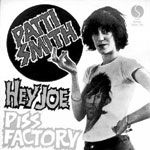 On
February 10, 1971, she opened for Gerard Malanga at a Poetry Project weekly reading
at St. Mark's Church on the Lower East Side. She was joined for three songs by
Lenny Kaye, a rock writer and record store clerk whom she had met through an article
he'd written for Jazz and Pop magazine about "Accapella" music, the
unaccompanied doo-wop of the Philly-New York corridor. Discovering they liked
the same type of obscure records, and knowing that he played guitar, she added
his rhythmic chording to her chant-sung poetry, though there was little sense
of where it might be heading. Patti continued performing as a poet/actress over
the next two years, opening for the New York Dolls at the Mercer Arts Center,
writing songs for Blue Öyster Cult, "reviewing" records for Creem
and Rock magazines, and publishing her first volumes of poetry, Seventh Heaven
and Witt. In November of 1973, she and Kaye reunited for a "Rock `n Rimbaud"
performance at Le Jardin off New York's Times Square, and the seeds for a band
were sown. They were accompanied by a succession of piano players, culminating
in the arrival of Richard "DNV" Sohl in the Spring of 1974. As a trio,
they began to play more regularly, a curious blend centered on Patti's improvised
wordplay, between free rock and free jazz, original songs mingling with strange
cover versions that were used as counterpoint and segue. On
February 10, 1971, she opened for Gerard Malanga at a Poetry Project weekly reading
at St. Mark's Church on the Lower East Side. She was joined for three songs by
Lenny Kaye, a rock writer and record store clerk whom she had met through an article
he'd written for Jazz and Pop magazine about "Accapella" music, the
unaccompanied doo-wop of the Philly-New York corridor. Discovering they liked
the same type of obscure records, and knowing that he played guitar, she added
his rhythmic chording to her chant-sung poetry, though there was little sense
of where it might be heading. Patti continued performing as a poet/actress over
the next two years, opening for the New York Dolls at the Mercer Arts Center,
writing songs for Blue Öyster Cult, "reviewing" records for Creem
and Rock magazines, and publishing her first volumes of poetry, Seventh Heaven
and Witt. In November of 1973, she and Kaye reunited for a "Rock `n Rimbaud"
performance at Le Jardin off New York's Times Square, and the seeds for a band
were sown. They were accompanied by a succession of piano players, culminating
in the arrival of Richard "DNV" Sohl in the Spring of 1974. As a trio,
they began to play more regularly, a curious blend centered on Patti's improvised
wordplay, between free rock and free jazz, original songs mingling with strange
cover versions that were used as counterpoint and segue.
One
of these, Patti's version of "Hey Joe," taking as its backdrop the Patty
Hearst kidnapping, became her first recorded work. Going into Electric Lady Studio
on the evening of June 5, 1974, the group attempted to see if the electricity
they were generating live could be translated to vinyl. Helped out by Tom Verlaine
(of the new band, Television) on lead guitar, funded by Robert Mapplethorpe, and
released on their own Mer Records, the result was one of the first indie-rock
DIY singles. The b-side was the prophetic "Piss Factory," which told
of Patti's stint as an assembly line worker and her vow to travel to New York:
"Watch me now!"
 Buoyed
by an energetic New Band scene centered around CBGB's in New York, the group -
Patti, Lenny, and DNV - traveled to California in the fall of `74, playing the
Whiskey in L.A. and the Fillmore (on audition night) in S.F. When they returned
east, they felt their sound needed filling out, recruiting guitarist Ivan Kral,
a Czech refugee. It was this combination that played CBGB's for eight weeks in
the spring of 1975, honing their concept and ultimately attracting the attention
of Clive Davis, who signed them to his fledgling Arista label that summer. Drummer
Jay Dee Daugherty had overseen their sound at CBGB's and had sat in with them
several times. He joined the band in time to record their debut album, with John
Cale at the producer's helm. Recorded at Electric Lady, Horses was released in
November 1975. It contained Patti's incantatory reworkings of rock classics like
"Gloria" and "Land (Of A Thousand Dances)", more traditional
song forms (the reggae "Redondo Beach," "Free Money"), and
streams-of -unconscious poetry ("Birdland"). It cracked the American
Top 50, paving the way for a new generation of art-rat-punk. Buoyed
by an energetic New Band scene centered around CBGB's in New York, the group -
Patti, Lenny, and DNV - traveled to California in the fall of `74, playing the
Whiskey in L.A. and the Fillmore (on audition night) in S.F. When they returned
east, they felt their sound needed filling out, recruiting guitarist Ivan Kral,
a Czech refugee. It was this combination that played CBGB's for eight weeks in
the spring of 1975, honing their concept and ultimately attracting the attention
of Clive Davis, who signed them to his fledgling Arista label that summer. Drummer
Jay Dee Daugherty had overseen their sound at CBGB's and had sat in with them
several times. He joined the band in time to record their debut album, with John
Cale at the producer's helm. Recorded at Electric Lady, Horses was released in
November 1975. It contained Patti's incantatory reworkings of rock classics like
"Gloria" and "Land (Of A Thousand Dances)", more traditional
song forms (the reggae "Redondo Beach," "Free Money"), and
streams-of -unconscious poetry ("Birdland"). It cracked the American
Top 50, paving the way for a new generation of art-rat-punk.
After
successfully touring America and Europe, sounding a "wake-up call" to
the legions of aspiring guitarists waiting in the wings, the Group returned to
the studio in the summer of 1976 to record Radio Ethiopia with producer Jack Douglas. Featuring a more rock-based sound - as in "Ask
The Angels," and "Pumpin" - even as the title cut heralded a field
where anything could and should happen, the band's touring was cut short when
Patti fell from a stage in Tampa, Florida, during "Ain't It Strange,"
cracking two vertebrae in her neck and taking an enforced convalescence.
 The
time off was spent preparing a volume of poetry, Babel;
and Easter, the 1978 release which not only gave the
Group its first Top 20 hit- "Because The Night," a collaboration between
Patti and Bruce Springsteen- but its most succinct statements of principle yet,
from "Twenty Fifth Floor" to "Rock and Roll Nigger." The maiden
production of Jimmy Iovine, the album became a worldwide hit, and Patti and the
band toured America & Europe throughout much of that year. But with so many
of their artistic and idealistic goals accomplished, the end was inevitably in
sight. In 1979, Patti released Wave, produced by Todd Rundgren, which seemed to
complete her seventies' saga. Even while the band's cover of "(So You Want
To Be A) Rock And Roll Star" spoke of her disenchantment with the trapping
of rock stardom, "Dancing Barefoot" and "Frederick" were inspired
by the new love in her life, Fred "Sonic" Smith, ex-MC5 guitarist and
leader of Detroit's Sonic Rendezvous Band. In the fall of 1979, after performing
what would be a farewell concert before 70,000 fans in a Florence, Italy soccer
stadium, Patti waved "bye, bye, hey hey" to her Group persona and moved
to the Motor City. She married Fred on March 1, 1980. The
time off was spent preparing a volume of poetry, Babel;
and Easter, the 1978 release which not only gave the
Group its first Top 20 hit- "Because The Night," a collaboration between
Patti and Bruce Springsteen- but its most succinct statements of principle yet,
from "Twenty Fifth Floor" to "Rock and Roll Nigger." The maiden
production of Jimmy Iovine, the album became a worldwide hit, and Patti and the
band toured America & Europe throughout much of that year. But with so many
of their artistic and idealistic goals accomplished, the end was inevitably in
sight. In 1979, Patti released Wave, produced by Todd Rundgren, which seemed to
complete her seventies' saga. Even while the band's cover of "(So You Want
To Be A) Rock And Roll Star" spoke of her disenchantment with the trapping
of rock stardom, "Dancing Barefoot" and "Frederick" were inspired
by the new love in her life, Fred "Sonic" Smith, ex-MC5 guitarist and
leader of Detroit's Sonic Rendezvous Band. In the fall of 1979, after performing
what would be a farewell concert before 70,000 fans in a Florence, Italy soccer
stadium, Patti waved "bye, bye, hey hey" to her Group persona and moved
to the Motor City. She married Fred on March 1, 1980.
They
lived a quiet, private life in a Detroit suburb, with their children Jackson and
Jesse, concentrating their energies on raising a family and following their musical
muse. In 1988, they released Dream of Life as a symbol
of their creative work together. It featured "People Have The Power"
and "Paths That Cross," the Smiths' tribute to the infinite positive
possibilities within us all, as well as a lullaby to children everywhere in "The
Jackson Song."
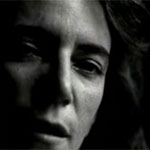 Patti
continued to write, releasing a compendium of her seventies' poetry in Early Work
(Norton); Woolgathering (Hanuman); and beginning a novel. She and Fred created
songs together, with an eye to recording in the summer of 1995, until Fred's death
of heart failure on November 4, 1994; among his last accomplishments was to teach
Patti her guitar chords. The passing of her brother, Todd, of a heart attack a
month later, further brought home to her how slight is our time on this earth.
She worked through her grief with song, as singers have done immemorial, in memorium. Patti
continued to write, releasing a compendium of her seventies' poetry in Early Work
(Norton); Woolgathering (Hanuman); and beginning a novel. She and Fred created
songs together, with an eye to recording in the summer of 1995, until Fred's death
of heart failure on November 4, 1994; among his last accomplishments was to teach
Patti her guitar chords. The passing of her brother, Todd, of a heart attack a
month later, further brought home to her how slight is our time on this earth.
She worked through her grief with song, as singers have done immemorial, in memorium.
She
had given a handful of performances, mostly poetry - her summer, 1993, reading
in Central Park attracted several thousand fans - over the years. Yet increasingly
she felt the need to perform, to reconnect with her audience not only for them
but herself, and she began appearing in out of the way venues, from Ann Arbor
to Toronto, to understand how to present her music in a modern setting. She gathered
her longtime collaborator Lenny Kaye, and drummer Jay Dee Daugherty, and added
bassist Tony Shanahan, a New Jersey musician who had worked with both Kaye and
John Cale, to provide live backing. Another Central Park reading in 1995, an impromptu
appearance at New York's Lollapalooza on the second stage, and tour of the west
coast both in poetry and full rock mode - all helped her find her stage presence
again. She contributed tracks to the Ain't Nothin' But A She Thing album (a version
of Nina Simone's "Don't Smoke In Bed") and the Dead Man Walking soundtrack
(Oliver Ray's "Walkin' Blind").
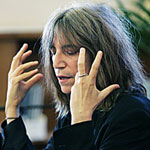 In
the summer of 1995, she entered New York's Electric Lady studios to begin recording
her sixth album. Produced by Malcolm Burn and Lenny Kaye, Gone Again features
old friends like Tom Verlaine and John Cale, new friends like keyboardist Luis
Resto and guitarist Oliver Ray, guest appearances by singer Jeff Buckley, cellist
Jane Scarpantoni, and mandolin player Kimberly Smith; and the inimitable Smith
magic of song and the spoken word. In
the summer of 1995, she entered New York's Electric Lady studios to begin recording
her sixth album. Produced by Malcolm Burn and Lenny Kaye, Gone Again features
old friends like Tom Verlaine and John Cale, new friends like keyboardist Luis
Resto and guitarist Oliver Ray, guest appearances by singer Jeff Buckley, cellist
Jane Scarpantoni, and mandolin player Kimberly Smith; and the inimitable Smith
magic of song and the spoken word.
A meditation on passage
and mortality, Gone Again celebrates life's illumination, and our place in the
celestial heavens.
As the poet Allen Ginsberg says, "Light
a candle, and continue the dance."
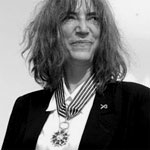 AMG:
"Gone Again took a stronger, more optimistic tone than might have been expected,
and was well received by many critics. Following closely on its heels, Peace
and Noise appeared in 1997, and earned a Grammy nomination for the track "1959";
a much darker affair than its predecessor, it took into account the deaths of
two more of Smith's inspirations, Allen Ginsberg and William S. Burroughs. Smith
returned in 2000 with Gung Ho, the most aggressive-sounding
and socially conscious album of her comeback; the song "Glitter in Their
Eyes" also earned her a second Grammy nomination. Smith and Arista parted
ways in 2002, with the label issuing Land (1975-2002),
a double-disc compilation of hits and rarities, as a wrap-up. Smith subsequently
signed with Columbia. Her first album for the label, Trampin',
appeared in spring 2004." AMG:
"Gone Again took a stronger, more optimistic tone than might have been expected,
and was well received by many critics. Following closely on its heels, Peace
and Noise appeared in 1997, and earned a Grammy nomination for the track "1959";
a much darker affair than its predecessor, it took into account the deaths of
two more of Smith's inspirations, Allen Ginsberg and William S. Burroughs. Smith
returned in 2000 with Gung Ho, the most aggressive-sounding
and socially conscious album of her comeback; the song "Glitter in Their
Eyes" also earned her a second Grammy nomination. Smith and Arista parted
ways in 2002, with the label issuing Land (1975-2002),
a double-disc compilation of hits and rarities, as a wrap-up. Smith subsequently
signed with Columbia. Her first album for the label, Trampin',
appeared in spring 2004."
Patti Smith received the Commandeur
de l’Ordre des Arts et des Lettres in 2005, the highest grade awarded
by the French Republic to eminent artists and writers who have contributed significantly
to furthering the arts throughout the world.
Other external
links of interest
|
|
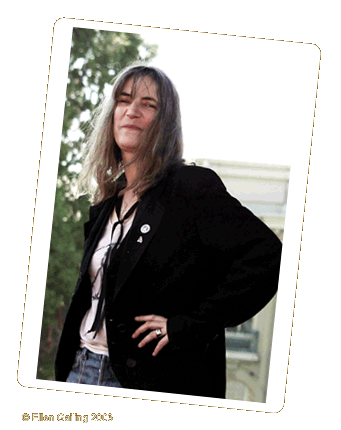
|


 On
February 10, 1971, she opened for Gerard Malanga at a Poetry Project weekly reading
at St. Mark's Church on the Lower East Side. She was joined for three songs by
Lenny Kaye, a rock writer and record store clerk whom she had met through an article
he'd written for Jazz and Pop magazine about "Accapella" music, the
unaccompanied doo-wop of the Philly-New York corridor. Discovering they liked
the same type of obscure records, and knowing that he played guitar, she added
his rhythmic chording to her chant-sung poetry, though there was little sense
of where it might be heading. Patti continued performing as a poet/actress over
the next two years, opening for the New York Dolls at the Mercer Arts Center,
writing songs for Blue Öyster Cult, "reviewing" records for Creem
and Rock magazines, and publishing her first volumes of poetry, Seventh Heaven
and Witt. In November of 1973, she and Kaye reunited for a "Rock `n Rimbaud"
performance at Le Jardin off New York's Times Square, and the seeds for a band
were sown. They were accompanied by a succession of piano players, culminating
in the arrival of Richard "DNV" Sohl in the Spring of 1974. As a trio,
they began to play more regularly, a curious blend centered on Patti's improvised
wordplay, between free rock and free jazz, original songs mingling with strange
cover versions that were used as counterpoint and segue.
On
February 10, 1971, she opened for Gerard Malanga at a Poetry Project weekly reading
at St. Mark's Church on the Lower East Side. She was joined for three songs by
Lenny Kaye, a rock writer and record store clerk whom she had met through an article
he'd written for Jazz and Pop magazine about "Accapella" music, the
unaccompanied doo-wop of the Philly-New York corridor. Discovering they liked
the same type of obscure records, and knowing that he played guitar, she added
his rhythmic chording to her chant-sung poetry, though there was little sense
of where it might be heading. Patti continued performing as a poet/actress over
the next two years, opening for the New York Dolls at the Mercer Arts Center,
writing songs for Blue Öyster Cult, "reviewing" records for Creem
and Rock magazines, and publishing her first volumes of poetry, Seventh Heaven
and Witt. In November of 1973, she and Kaye reunited for a "Rock `n Rimbaud"
performance at Le Jardin off New York's Times Square, and the seeds for a band
were sown. They were accompanied by a succession of piano players, culminating
in the arrival of Richard "DNV" Sohl in the Spring of 1974. As a trio,
they began to play more regularly, a curious blend centered on Patti's improvised
wordplay, between free rock and free jazz, original songs mingling with strange
cover versions that were used as counterpoint and segue. Buoyed
by an energetic New Band scene centered around CBGB's in New York, the group -
Patti, Lenny, and DNV - traveled to California in the fall of `74, playing the
Whiskey in L.A. and the Fillmore (on audition night) in S.F. When they returned
east, they felt their sound needed filling out, recruiting guitarist Ivan Kral,
a Czech refugee. It was this combination that played CBGB's for eight weeks in
the spring of 1975, honing their concept and ultimately attracting the attention
of Clive Davis, who signed them to his fledgling Arista label that summer. Drummer
Jay Dee Daugherty had overseen their sound at CBGB's and had sat in with them
several times. He joined the band in time to record their debut album, with John
Cale at the producer's helm. Recorded at Electric Lady, Horses was released in
November 1975. It contained Patti's incantatory reworkings of rock classics like
"Gloria" and "Land (Of A Thousand Dances)", more traditional
song forms (the reggae "Redondo Beach," "Free Money"), and
streams-of -unconscious poetry ("Birdland"). It cracked the American
Top 50, paving the way for a new generation of art-rat-punk.
Buoyed
by an energetic New Band scene centered around CBGB's in New York, the group -
Patti, Lenny, and DNV - traveled to California in the fall of `74, playing the
Whiskey in L.A. and the Fillmore (on audition night) in S.F. When they returned
east, they felt their sound needed filling out, recruiting guitarist Ivan Kral,
a Czech refugee. It was this combination that played CBGB's for eight weeks in
the spring of 1975, honing their concept and ultimately attracting the attention
of Clive Davis, who signed them to his fledgling Arista label that summer. Drummer
Jay Dee Daugherty had overseen their sound at CBGB's and had sat in with them
several times. He joined the band in time to record their debut album, with John
Cale at the producer's helm. Recorded at Electric Lady, Horses was released in
November 1975. It contained Patti's incantatory reworkings of rock classics like
"Gloria" and "Land (Of A Thousand Dances)", more traditional
song forms (the reggae "Redondo Beach," "Free Money"), and
streams-of -unconscious poetry ("Birdland"). It cracked the American
Top 50, paving the way for a new generation of art-rat-punk. The
time off was spent preparing a volume of poetry,
The
time off was spent preparing a volume of poetry,  Patti
continued to write, releasing a compendium of her seventies' poetry in Early Work
(Norton); Woolgathering (Hanuman); and beginning a novel. She and Fred created
songs together, with an eye to recording in the summer of 1995, until Fred's death
of heart failure on November 4, 1994; among his last accomplishments was to teach
Patti her guitar chords. The passing of her brother, Todd, of a heart attack a
month later, further brought home to her how slight is our time on this earth.
She worked through her grief with song, as singers have done immemorial, in memorium.
Patti
continued to write, releasing a compendium of her seventies' poetry in Early Work
(Norton); Woolgathering (Hanuman); and beginning a novel. She and Fred created
songs together, with an eye to recording in the summer of 1995, until Fred's death
of heart failure on November 4, 1994; among his last accomplishments was to teach
Patti her guitar chords. The passing of her brother, Todd, of a heart attack a
month later, further brought home to her how slight is our time on this earth.
She worked through her grief with song, as singers have done immemorial, in memorium. In
the summer of 1995, she entered New York's Electric Lady studios to begin recording
her sixth album. Produced by Malcolm Burn and Lenny Kaye, Gone Again features
old friends like Tom Verlaine and John Cale, new friends like keyboardist Luis
Resto and guitarist Oliver Ray, guest appearances by singer Jeff Buckley, cellist
Jane Scarpantoni, and mandolin player Kimberly Smith; and the inimitable Smith
magic of song and the spoken word.
In
the summer of 1995, she entered New York's Electric Lady studios to begin recording
her sixth album. Produced by Malcolm Burn and Lenny Kaye, Gone Again features
old friends like Tom Verlaine and John Cale, new friends like keyboardist Luis
Resto and guitarist Oliver Ray, guest appearances by singer Jeff Buckley, cellist
Jane Scarpantoni, and mandolin player Kimberly Smith; and the inimitable Smith
magic of song and the spoken word. AMG:
"Gone Again took a stronger, more optimistic tone than might have been expected,
and was well received by many critics. Following closely on its heels,
AMG:
"Gone Again took a stronger, more optimistic tone than might have been expected,
and was well received by many critics. Following closely on its heels, 